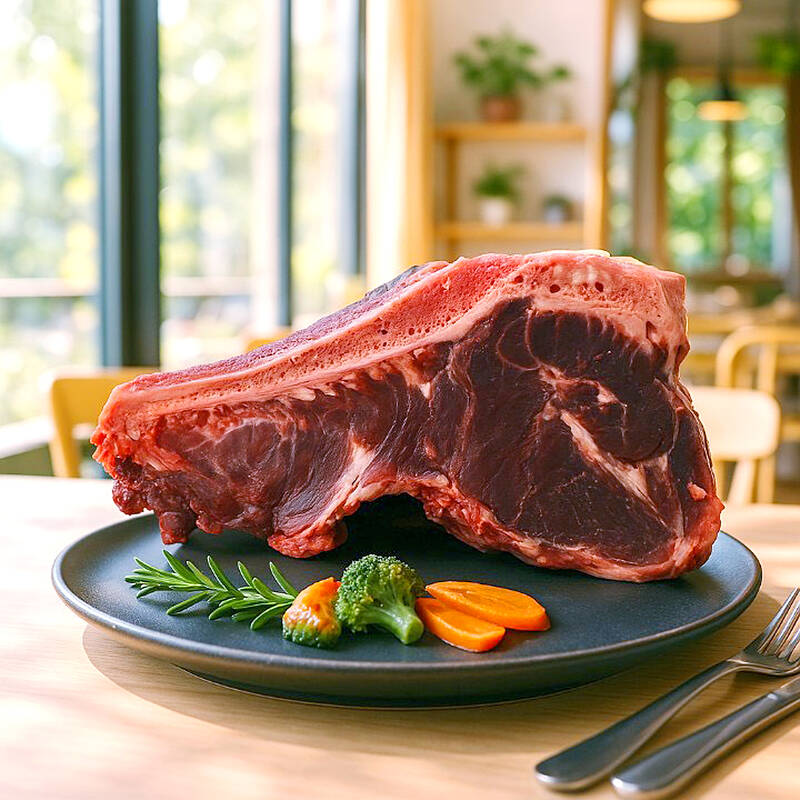The Ministry of Agriculture’s Taiwan Livestock Research Institute has advanced beef aging techniques, boosting aged beef yields to nearly 90 percent as well as improving its tenderness.
Dry-aged beef is so expensive that it could cost more than NT$1,000 for a steak, mainly due to the low yields of dry-aging methods, the institute said.
Beef aging refers to the process in which beef is held at a low temperature for a period of time, allowing enzymes in the meat to break proteins and fat down into free amino acids and volatile fatty acids, it said.

Photo courtesy of the Ministry of Agriculture’s Taiwan Livestock Research Institute
The aging process enriches the beef’s flavor by adding a touch of the fragrance of nuts or cream, while making the meat taste more fresh and tender, the institute said, adding that such techniques can be categorized into dry-aging and wet-aging.
Beef going through a dry-aging process would be placed bare in a low-temperature environment and end up with a layer of crust forming on the surface, it said.
As the crust must be removed for the meat to be edible, dry-aged beef’s yields are usually less than only 60 percent of the raw beef, the institute said.
The wet-aging method involves wrapping the beef in packaging at low temperatures, and its yields are higher than 90 percent, it said.
However, its flavors are considered less delicious and an odor could develop, as the wrappers can block the beef’s surface water from evaporating, it said.
Such problems could not be easily resolved simply by vacuum-packing the beef and wet-aging it in a fridge, it said, adding that the quality of aged beef depends highly on proper control of the aging room’s humidity and temperature.
The institute has been researching the incorporation of dry-aging techniques under different aging conditions to innovate the wet-aging method, it said.
Although the innovative wet-aging method has yet to meet the goal of 90 percent in yields, it has nearly doubled the number of free amino acids in aged beef, the institute said.
Umami-tasting amino acids, such as glutamic acid, and sweet-tasting amino acids were all found to be significantly higher in aged beef than in raw beef, it added.
The aged beef also had more poly and mono-unsaturated fatty acids, as well as increased volatile substances such as aldehydes and ketones that would add fruit, oil and herb-flavors, the institute said.
To advance beef-aging techniques is not only to optimize aging conditions, but also to establish higher hygiene standards at the slaughter and cutting stages, it said, adding that the quality of local beef could be further enhanced with improved meat processing approaches and technology.

“China is preparing to invade Taiwan,” Deputy Minister of Foreign Affairs Francois Wu (吳志中) said in an exclusive interview with British media channel Sky News for a special report titled, “Is Taiwan ready for a Chinese invasion?” the Ministry of Foreign Affairs said today in a statement. The 25-minute-long special report by Helen Ann-Smith released yesterday saw Sky News travel to Penghu, Taoyuan and Taipei to discuss the possibility of a Chinese invasion and how Taiwan is preparing for an attack. The film observed emergency response drills, interviewed baseball fans at the Taipei Dome on their views of US President

The Central Weather Administration (CWA) today issued a "tsunami watch" alert after a magnitude 8.7 earthquake struck off the Kamchatka Peninsula in northeastern Russia earlier in the morning. The quake struck off the east coast of the Kamchatka Peninsula at 7:25am (Taiwan time) at a depth of about 19km, the CWA said, citing figures from the Pacific Tsunami Warning Center. The CWA's Seismological Center said preliminary assessments indicate that a tsunami could reach Taiwan's coastal areas by 1:18pm today. The CWA urged residents along the coast to stay alert and take necessary precautions as waves as high as 1m could hit the southeastern

The National Museum of Taiwan Literature is next month to hold an exhibition in Osaka, Japan, showcasing the rich and unique history of Taiwanese folklore and literature. The exhibition, which is to run from Aug. 10 to Aug. 20 at the city’s Central Public Hall, is part of the “We Taiwan” at Expo 2025 series, highlighting Taiwan’s cultural ties with the international community, National Museum of Taiwan Literature director Chen Ying-fang (陳瑩芳) said. Folklore and literature, among Taiwan’s richest cultural heritages, naturally deserve a central place in the global dialogue, Chen said. Taiwan’s folklore would be immediately apparent at the entrance of the

ECONOMIC BENEFITS: The imports from Belize would replace those from Honduras, whose shrimp exports have dropped 67 percent since cutting ties in 2023 Maintaining ties with Taiwan has economic benefits, Ministry of Foreign Affairs officials said yesterday, citing the approval of frozen whiteleg shrimp imports from Belize by the Food and Drug Administration (FDA) as an example. The FDA on Wednesday approved the tariff-free imports from Belize after the whiteleg shrimp passed the Systematic Inspection of Imported Food, which would continue to boost mutual trade, the ministry said. Taiwan’s annual consumption of whiteleg shrimps stands at 30,000 tonnes, far exceeding domestic production, the ministry said. Taiwan used to fill the gap by importing shrimps from Honduras, but purchases slumped after Tegucigalpa severed diplomatic ties with Taiwan